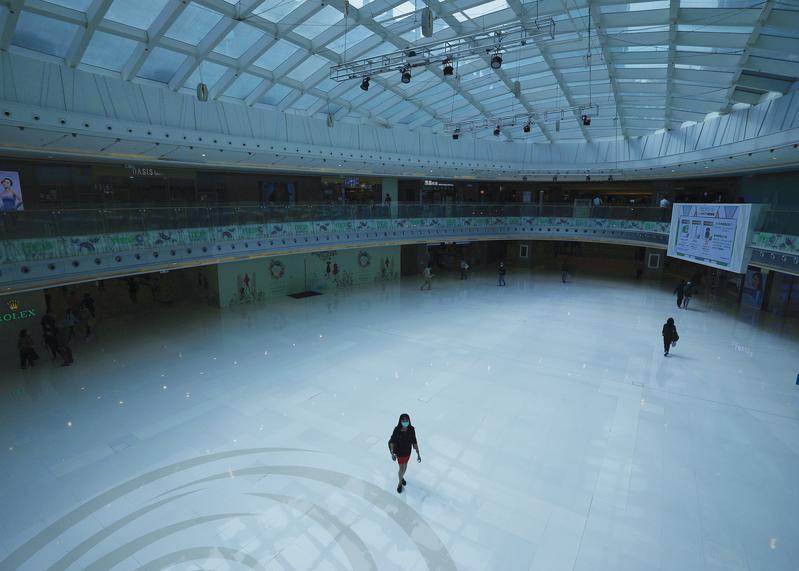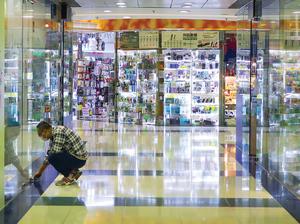 Metro City Plaza in Tseung Kwan O receives few visitors as the novel coronavirus pandemic spreads across the world. (CALVIN NG / CHINA DAILY)
Metro City Plaza in Tseung Kwan O receives few visitors as the novel coronavirus pandemic spreads across the world. (CALVIN NG / CHINA DAILY)
“Check the website. The prices are insanely cheap!”
Angelina Chang, a 25-year-old employee at an investment bank in Hong Kong, received such a message from her friend telling her to order some beauty products online.
She opened the link and found all the products on sale offered discounts of up to 45 percent — it was a flash sale by duty-free retailer DFS.
Amid a dearth of walk-in customers at physical stores, it’s hard for retailers to run offline marketing campaigns. Thus, they have to move to online (marketing campains)
Jennifer Ye Min, China consumer markets leader at PwC
After having picked all the items she needed within minutes, Chang placed a HK$6,000 (US$774) order and sent the information on the sales campaign to friends. She then helped her friends on the Chinese mainland place another two orders worth nearly HK$20,000.
“That night, I found at least 10 people talking about the sales campaign on WeChat, and three insurance salesmen said they could help their mainland clients order online,” she recalled.
“Everybody has been tightening their purse strings since the novel coronavirus pandemic, and this is a perfect time to loosen them.”
According to a DFS employee, the retail chain secured more than 40,000 orders within 24 hours, but stipulated that only orders with a total value exceeding HK$5,888 were entitled to the discount. Based on this, it’s estimated the sales value could hit HK$235.52 million in a matter of hours.
As a travel retailer, DFS is heavily reliant on the purchasing power of tourists, especially those from the mainland. However, sales at its offline outlets have reeled under the coronavirus pandemic, global travel alerts and plummeting tourist arrivals in Hong Kong.
Official data shows that tourist arrivals in the city tumbled 96 percent year-on-year to a new low of 199,000 in February, while the number of mainland visitors nose-dived by nearly 98 percent.
So far, the pandemic has infected more than 80,000 and killed over 3,200 on the mainland. Millions of people have been confined to their homes since January. However, the situation turned the corner in March as new infection cases began falling. The number of new daily cases on the mainland dropped to below 100 for the first time on March 6 — almost all involving travelers from overseas.
Amid the signs of a recovery, many people like Chang believe it’s now time to release the pent-up consumption demand. She has been browsing through e-commerce platforms of late, ordering many items she would like to buy.
 Disappointed at the lack of business, a shop owner closes his store early at Metro City Plaza in Tseung Kwan O. (CALVIN NG / CHINA DAILY)
Disappointed at the lack of business, a shop owner closes his store early at Metro City Plaza in Tseung Kwan O. (CALVIN NG / CHINA DAILY)
Maintaining relationships
Many retailers are ready to win back consumers. Besides DFS, Suning.com, China Duty Free and some brands’ official sites have launched promotions, offering discounts to customers via their e-commerce platforms.
“Amid a dearth of walk-in customers at physical stores, it’s hard for retailers to run offline marketing campaigns. Thus, they have to move to online (marketing campains),” said Jennifer Ye Min, China consumer markets leader at PwC.
Ye said these campaigns are warm-up events that could help retailers boost sales and reduce inventory to a certain extent. But their primary aim goes further.
“These campaigns are aimed mainly at maintaining consumer relationships. For today’s retail market, it does matter if retailers are able to attract customers and foster close links with them. After consumers have built up enough trust, they’ll take the initiative to visit physical stores when conditions improve,” she said.
Ye noted that many salespeople have walked from behind the counter to strengthen customer relationships in recent months.
When shopping malls go nearly empty, salespeople spend more time managing WeChat groups consisting of regular customers, sharing product information, answering questions and offering coupons. This type of marketing is now considered the most effective way to build engagement and boost sales.
Recover after crisis
Ye said she expects to see a quick rebound in some nonessentials categories, including the garment, beauty products and jewelry sectors that were hard-hit in January and February. After all, the pursuit of beauty is “always human nature”, she added.
But does it mean the so-called “compensatory consumption” will last when the pandemic is over? Or can we see a V-shape recovery?
During the SARS epidemic in 2003, growth of China’s retail sales plunged from 9.3 percent in March that year to 4.3 percent two months later, according to official data. After the SARS outbreak ended, growth of retail sales bounced back to 8.3 percent within a month and stabilized at a rate of more than 9 percent from July that year.
“Compared with the period during the SARS outbreak, consumers’ pent-up consumption demand is less apparent today, as both consumer confidence and spending sentiment are weaker,” said Teresa Lam, vice-president of Asia distribution and retail at Fung Business Intelligence.
Before the coronavirus pandemic, retail sales in December rose 8 percent year-on-year. The growth rate was already slower compared with its high-growth trajectory in 2003.
Services and consumption, which have taken the brunt of the pandemic, now make up a larger proportion of China’s economy. According to a report by consultancy firm Bain & Co, services and consumption account for 54 percent of today’s economy, while it was just 42 percent in 2003.
“Today, China’s economy is more sensitive to falling market demand, which means it’s much harder to recover,” said Lam.
In the long term, Ye predicted that China’s retail sales will recover gradually later this year and see steady growth before the year ends or by early 2021. She said the overall trend should be in line with the country’s economic growth.
According to official statistics released on Monday, retail sales of consumer goods dropped 20.5 percent in January and February this year, while online sales surged by 3 percent, accounting for about a fifth of overall retail sales.
“Chinese consumers have developed a habit of shopping online for years. When they’re forced to stay at home to avoid getting infected, they’re still able to buy things online. It means some of their pent-up consumption demand has been unleashed during the pandemic,” Lam said.
But, in a good way, consumers’ online shopping habits have strengthened in recent months. It’s believed the new consumption mode, including online entertainment, internet medical care, online fitness, fresh food e-commerce, distant learning and telecommuting platforms, will continue to grow in the future, helping to mitigate the economic losses and bring long-term benefits.


